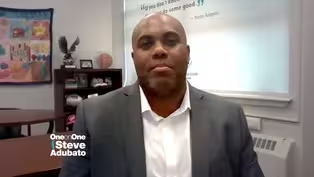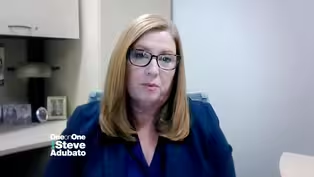One-on-One
CEO of Community Foodbank of NJ Addresses Food Insecurity
Preview: Season 2023 Episode 2664 | 8m 30sVideo has Closed Captions
CEO of Community Foodbank of NJ Addresses Food Insecurity
Elizabeth McCarthy, President & CEO of the Community FoodBank of New Jersey, sits down with Steve Adubato to discuss generational poverty, its connection to food insecurity, and the organization's goal of reducing food insecurity by 50% before 2030.
Problems playing video? | Closed Captioning Feedback
Problems playing video? | Closed Captioning Feedback
One-on-One is a local public television program presented by NJ PBS
One-on-One
CEO of Community Foodbank of NJ Addresses Food Insecurity
Preview: Season 2023 Episode 2664 | 8m 30sVideo has Closed Captions
Elizabeth McCarthy, President & CEO of the Community FoodBank of New Jersey, sits down with Steve Adubato to discuss generational poverty, its connection to food insecurity, and the organization's goal of reducing food insecurity by 50% before 2030.
Problems playing video? | Closed Captioning Feedback
How to Watch One-on-One
One-on-One is available to stream on pbs.org and the free PBS App, available on iPhone, Apple TV, Android TV, Android smartphones, Amazon Fire TV, Amazon Fire Tablet, Roku, Samsung Smart TV, and Vizio.
Providing Support for PBS.org
Learn Moreabout PBS online sponsorship(upbeat music) - We're honored to be joined by Elizabeth McCarthy, President and CEO of the Community Food Bank of New Jersey.
Elizabeth, great to have you with us for the first time.
It will not be the last.
Good to have you.
- Thanks so much for having me, Steve.
I appreciate it.
- Well, for those who've been watching us for a while, they know that we're very involved in public awareness around food insecurity issues, and have been working with community food bank for a long time.
Elizabeth, put in perspective the number, I don't even like saying post COVID.
We're doing this in the fall of late in 2023.
It'll be seen after that, post COVID.
I don't know what that means.
Where are we now in terms of how many people are food insecure in the state, but also let's focus on seniors and children, please.
- Yeah, I think not where we expect it to be.
Traditionally, as unemployment has gone down, food insecurity has gone down, and we have not seen that in this, as you're right, post COVID world, however you define that.
There are three quarters of a million people in New Jersey, one of the wealthiest states in the country that are food insecure.
And- - Three quarters?
- Three quarters of a million.
- Go ahead.
- 200,000 of whom are children.
So it is really a dire state.
And what we're seeing is that people are working.
People are coming to food pantries to work with our partners who are working, but cannot make it from paycheck to paycheck.
I know we all, we've all seen in grocery stores, just how much more expensive everything has gotten.
For people on very limited funds, that problem is really exacerbated.
- Describe as the website is up for the community food bank, the work that you do, A, and B, how people can be helpful beyond saying, "Oh, that's terrible."
Which we all will say, because there's also 135,000 plus seniors, age 60 and above who are food insecure.
Disproportionately in Atlantic Cape May, Cumberland County, the southern part of the state.
Beyond saying, "Wow, that's terrible," what can people do as you talk about the work of the food bank, please?
- Hey, first, I'm glad you brought up seniors.
That's actually the largest growing group of food insecure people, which is really just a horrible situation.
There's so many ways to help.
And that's one of the things that's wonderful about the food bank.
We have right on our website, you can find places to volunteer.
We really, really rely on volunteers, who'll come and help us pack food, sort food, who are even children can come and put together food packs for other kids.
It's actually a great volunteer opportunity.
Obviously donating funds also, especially for things like diapers, and period products that people don't necessarily think of as adding to food insecurity.
But when people are making choices about where they spend their money, those are some of the very expensive items that they have to buy.
We have really been focusing on, we give out over a hundred million pounds of food a year, which is an incredible number, but are much more focused on trying to get to the root causes of food insecurity.
So really try, we would love to distribute less, in the fact that we would hope that there would be less demand.
- Okay, let's talk about that.
We focus very often on public policy, or policies, plural, as it relates to communities that are disadvantaged, that are struggling disproportionately.
Are there any, from your perspective, Elizabeth, are there any government public policies that could and should be changed, that would have a positive impact on the food insecurity crisis in this state and nation, please?
- Absolutely.
I mean, the elimination of the tax credit we saw after COVID, doubled child poverty in this country.
- So that right there.
- Talk about that.
I'm sorry for interrupting.
Are you talking about the child tax credit?
- Yes, the child tax credit that was eliminated with doubled child poverty.
There are now about 15% of children in this country are living in poverty, which is just something for, you know, a wealthy nation.
It just, to me feels almost criminal.
So that is something that could definitely be done on the federal level.
We are very lucky in New Jersey that we have a government that is committed to this issue.
So compared to other states, we actually have much more funding going toward food insecurity.
We also have a higher number for supplemental nutrition assistance programs.
SNAP, used to be known as food stamps.
But there are still many people who don't know they're eligible, or who don't know how to apply.
So a big part of our work is sort of getting that word out to families, that this is something that could greatly help them be able to afford food for their families.
- You know, you talked about the food bank being involved in a whole range of services beyond providing food to those who need it, those who are food insecure.
You talked about period products.
What was the other area you talked about?
- Diapers.
- Okay.
So it leads me to the question of the Community Food Bank of New Jersey's longer term, strategic...
Even though long term, I don't know what that means in these days.
Planning ahead, right?
- Yeah.
- I'm sure God laughs.
God laughs when we do that.
That being said.
- Exactly.
- Could you describe as such, the strategic plan of the organization, please?
- Absolutely.
A big part of it, is to try to work on those root causes.
So our overarching goal is to reduce food insecurity in the state of New Jersey by 50% by the year 2030.
It's a very ambitious goal.
By 50%.
We think we can do it.
If we as a society make a commitment to do it, we really think that is an achievable number.
Some of the things we do to help with that, is we do a lot of job training.
We've off, we've done culinary training for a long time, but we've recently started a program for warehouse training program.
Those are actually well-paying jobs in the state of New Jersey.
- Oh, oh, back up a little bit.
- Yeah.
- I'm sorry, Liz.
Back up.
We actually did a feature on the culinary program.
A couple of 'em.
- Yes.
- But what was the second one?
Explain that again.
The warehouse.
- The warehouse training program.
So learning to use a forklift, learning to, you know, stack pallets, a pallet jack, things like that, that you could go get a job at, you know, at Amazon, at Home Depot, that are really much more decent paying jobs, and can get you benefits and those kind of things.
So we've have had three graduating classes, but plan to continue to grow on that path also.
So not everyone wants to work in a kitchen.
This is great to have another option.
We're also doing a lot of, we do some financial training so that families can understand how to make their dollars go further for food.
Things like the SNAP that I talked about, getting more people signed up for SNAP.
So really trying to shorten the line at pantries, to say, not this many people should have to go to food pantries.
It just doesn't seem right.
In this day and age.
- This mission, Elizabeth, this work is not new for you.
Coming to the Community Food Bank of New Jersey is relatively new.
Describe for folks.
Tell folks your background before you came to this position.
- Sure.
I mean, for 25 years I've worked in programs that, in social service programs that work in communities that are plagued by generational poverty and systemic racism.
So it really did feel like a natural extension.
I was very excited.
I've long known about the great work of the food bank, but mostly knew about the food distribution.
I didn't know about all the anti-poverty work, and about really trying to get to those root causes, and that's why I was really excited to join.
It really ties right into much of the work I've done, whether it was through mental health, or early childhood education programs, but really trying to get to those root causes of poverty.
- We will continue here at the Caucus Educational Corporation, along with our partners in public broadcasting, to shine a light is such a cliche.
We will continue to do extensive, important, impactful programming on food insecurity issues, and we're proud to be partners with the Community Food Bank.
Elizabeth McCarthy is in fact the President and CEO of the Community Food Bank of New Jersey.
We thank you so much for joining us.
We appreciate it.
- We really appreciate your support, Steve.
Thank you.
You got it.
Stay with us.
We'll be right back.
- [Narrator] One-On-One with Steve Adubato has been a production of the Caucus Educational Corporation.
Funding has been provided by Horizon Blue Cross Blue Shield of New Jersey.
Valley Bank.
NJM Insurance Group.
Prudential Financial.
Kean University.
The Healthcare Foundation of New Jersey.
The Fidelco Group.
Newark Board of Education.
And by PSE&G, Promotional support provided by NJBIZ.
And by Insider NJ.
NJM Insurance Group has been serving New Jersey businesses for over a century.
As part of the Garden State, we help companies keep their vehicles on the road, employees on the job and projects on track, working to protect employees from illness and injury, to keep goods and services moving across the state.
We're proud to be part of New Jersey.
NJM, we've got New Jersey covered.
Life-Changing Services That The Boys & Girls Club Provides
Video has Closed Captions
Clip: S2023 Ep2664 | 9m 55s | Life-Changing Services That The Boys & Girls Club Provides (9m 55s)
Reducing New Jersey's Carbon Footprint
Video has Closed Captions
Clip: S2023 Ep2664 | 9m 13s | Reducing New Jersey's Carbon Footprint (9m 13s)
Providing Support for PBS.org
Learn Moreabout PBS online sponsorship
- News and Public Affairs

Top journalists deliver compelling original analysis of the hour's headlines.

- News and Public Affairs

FRONTLINE is investigative journalism that questions, explains and changes our world.












Support for PBS provided by:
One-on-One is a local public television program presented by NJ PBS

